The opening weekend of Wexford Festival Opera 2022 offered not just three operas on the main stage of the National Opera House, but also a lunchtime recital, pop-up events around the town, and two ‘pocket operas’ which engaged with the supernatural – this year’s theme is Music and Magic – in contrasting ways, contemplative and comic.
Colm Tóibín may now be domiciled in the US, but his relationship with Wexford Festival Opera is strong and long-lived. Growing up in Enniscorthy, he recalls being told of his aunt’s involvement with the very first meeting to discuss inaugurating the Festival, and he first attended a performance (Bizet’s Les Pêcheurs de perles) when he was a teenager: “I was overwhelmed by it all … Coming out of the dress rehearsal that night … I felt that whatever that world of opera was, I wanted more of it.”
When composer Alfredo Caruso approached him and proposed an opera based upon Tóibín’s fifth, award-winning novel,The Master (2004), his involvement in that ‘world of opera’ took a new turn. The novelist worked with the director Ron Daniels to form a libretto, excising about one third of the original story, and the result is an intimate chamber piece in a single act, lasting about 110 minutes, which received its professional premiere in the Jerome Hynes Theatre at the National Opera House, directed by Conor Hanratty, designed by Lisa Krugel, and led from the piano by Caruso himself.
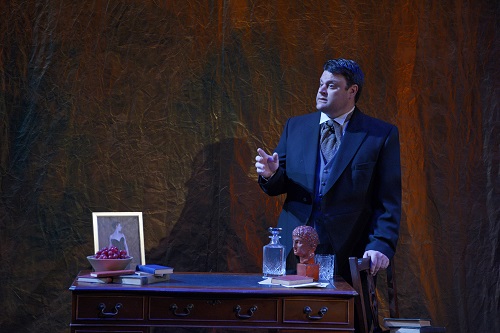
The libretto covers just a few years of James’s life, beginning with the humiliation of the failure of his play, Guy Domville, which saw him first seek seclusion in the Sussex town of Rye, then flee to Ireland where more social embarrassment ensued, and then return to Italy where he found love with a charismatic but egotistical sculptor, Hendrik Andersen. James’s relationship with his sister, the invalided Alice, and brother James are explored; but, he can only find escape in his writing, and commences a ghost story about Alice, his cousin Minnie Temple, and close friend Constance Fenimore Woolson, who are all now dead.
Given the large cast of characters and the limited dimensions of the Jerome Hynes Theatre stage, Hanratty’s direction is skilful and imaginative. Scenes in which Henry James (the British tenor Thomas Birch) converses with the ghost of Constance Fenimore Willson (the Bulgarian-Turkish mezzo-soprano Annabella Vesela Ellis) alternate with varied ensembles scenes and the transitions between them are choreographed with precision and persuasiveness. James argues with Edmund Gosse (British baritone Lawrence Gillians) about memories and the subconscious. There are scenes in which the writer cannot repress his homosexual feelings – a charged but unconsummated night in bed with Oliver Wendell Holmes (British baritone James Wafer) in Minnie Temple’s house, is tense with unfulfilled desire. Towards the close, James disposes of the dresses of Fenimore Woolson, after she has committed suicide, in the Venetian lagoon, as he struggles with his guilt about her death.
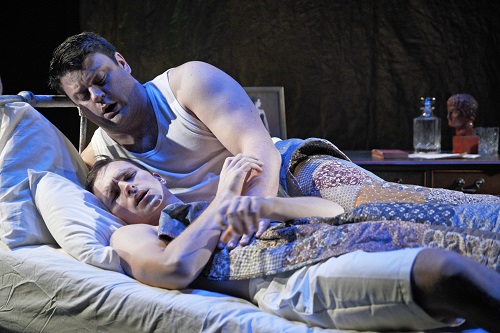
Krugel’s designs are minimal but effective – a desk and pile of books, a wash basin and bed, define different environments, and we move discreetly between public and private domains, internal and external locales – and are aided by Paddy McLaughlin’s atmospheric lighting.
Birch and Ellis work hard and if the tenor is a bit pushed at times when the tessitura rises, and the mezzo-soprano’s diction is sometimes less than clear, then both singers show impressive stamina and real engagement with their roles. The large cast convince in a wide range of cameo roles and are sonorous of voice, perhaps a little unalleviatedly so, in the ensemble numbers.
The problem with the opera, however, is that Caruso’s score doesn’t sustain interest over nearly two hours; nor does it have the diversity of expression to complement the variety of dramatic situations and the intense psychological charge of the narrative. Minimalist-style patterns abound, interpolated with pastiche – for the masked dance, for example – but there’s no defining musical ‘voice’ that might seek to articulate the inner lives of the characters. It doesn’t take us inside Henry James’s mind, as Tóibín’s novel does, as the writer’s reflections move between the present and the past. And, more than this, the music does not serve as a substitute for the written word, which in Tóibín’s novel is shown to have the power to relieve the suffering of both loss and longing.
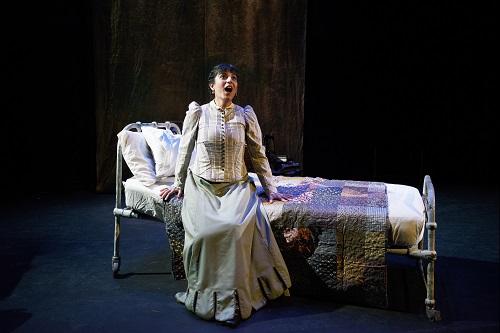
Caruso’s is a ‘helpful’ score, in that it supports the singers, their lines often doubled in the bass or melody lines, and Caruso did sterling work at the keyboard to guide the soloists and ensemble. But, if felt like a long two hours.
In his programme book note to The Spectre Knight by Alfred Cellier (1844-91), David Chandler suggests that with his 1874 comic opera The Sultan of Mocha, which was dedicated to Arthur Sullivan, Cellier ‘arguably established himself as the more promising composer for the popular stage’, and that ‘at his best … [Cellier] could compete with Sullivan on equal terms’ – though Chandler does allow that Cellier was unable to build effectively upon his early promise and success, and that his masterpiece, Dorothy (1886), came too late to enable him to develop a reputation as ‘a distinctive voice in the world of light musical theatre’.
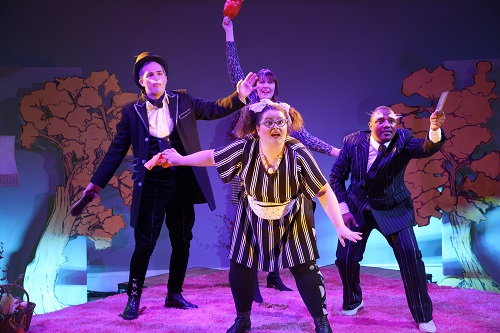
The Spectre Knight, a one-act ‘fanciful operetta’ with a libretto by James Albery – which was premiered by the Comedy Opera Company in 1878, as a curtain-raiser to Sullivan’s The Sorcerer and reprised later that year as a companion piece to HMS Pinafore – may not be especially ‘distinctive’, but as this performance at Wexford Arts Centre confirmed, it’s accomplished, well-crafted and offers charming light entertainment.
Cellier began his musical career as a choir-boy at the Chapel Royal (as a contemporary of Sullivan), subsequently becoming an organist in Blackheath, later in Belfast and then, returning to London, at St Alban’s, Holborn. But, it was to the stage, not the Church, that he was drawn, and after serving as Musical Director at the Court Theatre, in 1871 he was appointed to the same role at the Prince’s Theatre, Manchester. From 1877-80 he was Conductor at the Savoy Theatre, subsequently held appointments at the Opera Comique, Criterion and St James’s theatres. For many years Cellier had close associations with D’Oyly Carte: he was the company’s representative in Australia and the US, assisted Sullivan as conductor of Gatti’s Covent Garden promenade concerts in the late 1870s, and conducted many of the ‘Savoy operas’. So, he knew his craft, and in this production, the director Sinéad O’Neill and musical director, Gioele Muglialdo – along with an excellent young cast – expertly exploited the energy and charm of The Spectre Knight.
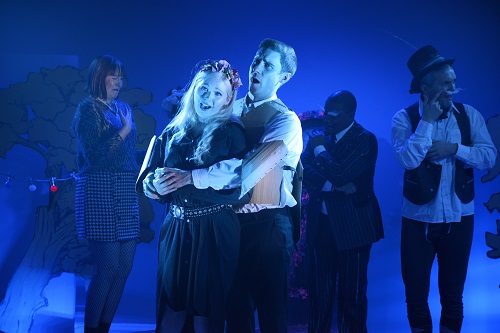
Albery’s libretto is slight but witty and neatly allusive. The Grand Duke, his daughter Viola and what remains of his court have been banished to an enchanted glen (much like Duke Senior in As You Like It) where these self-deluding noble paupers try to keep up appearances and pretences – scolding imagined servants, filling wine bottles with water, and giving thanks that they still have their aristocratic titles, at least. Viola (like Prospero’s daughter, Miranda) has thus seen no men other than her father and his Lord Chamberlain – until, that is, her cousin Otho appears, disguised as a friar (a nod to Duke Vincentio in Measure for Measure), determined to win her heart. When she tells him of the spectre knight who haunts the glen, he sees an opportunity for further disguise and appears before her one night in the form of the ghost. The shadow of Hamlet looms large: the knight tells Viola, “I only mix with ghosts well known, With Caesar and Pompey I pick a bone; Among my friends the noblest are there, I’m on visiting terms with Hamlet’s father”. Viola is smitten, Otho reveals himself – and that he has overthrown her father’s usurpers, and the throne can now be reclaimed. The Duke blesses their nuptials and order is restored.
O’Neill explains that she set out to capture the “bright, zany, madcap” mood of Cellier and Albery’s musical jape, and she and designer Lisa Krugel certainly achieve this. The ‘haunted’ glen is a raised, cerise-pink circle, ringed with foliage and adorned with the vegetables for which the Duke and his entourage must scavenge. There are reminders, too, of former grandeur: standing lamps and a grandfather clock are bedecked with floral garlands, as civilisation is absorbed by nature. The time period is ambiguous: the libretto instructs, ‘Time – The educated will perceive, the uneducated will not require to know’, though the ghost’s response to Viola’s delight in his youthful appearance, ‘I was but twenty-eight when I was slain, But I’ve been buried for three hundred years’, places the action c.1594. Here, Elizabethan and modern blend in both costumes and text, and the spoken dialogue has been given a light ‘up-date’ to keep it lively and sharp.
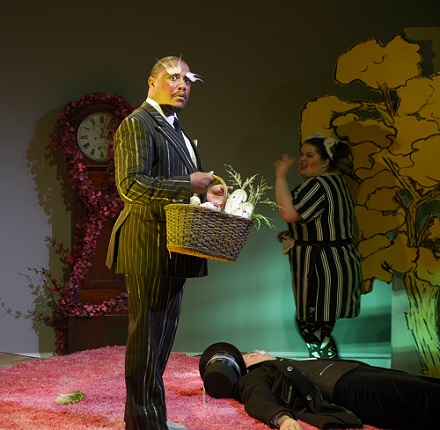
While there’s some ‘funny’ business with a cuddly toy bear during the overture – the bear proves delightedly appreciative of Muglialdo’s nimble piano playing, and the musical director sports a fluffy white scut under his tails (he sprouts a fine pair of bunny ears in the finale) – thereafter O’Neill indulges the sentimentality while keeping one tongue firmly in cheek.
Thomas Bennett was a resonant duke, the gravity of his deep, cavernous bass nicely undercut by his “half-crazed” – according to his Lord Chamberlain – behaviour and self-delusions. In the latter role, the South African tenor Monwabisi Lindi displayed a relaxed voice, fitting for the forbearance and patience he must show as he extends the shelf-life of the Duke’s cellar and gathers nature’s bounty to keep the court fed. As the Second Lady, mezzo-soprano Erin Fflur gave a masterclass in the expressive capabilities of eyebrows and facial expressions, and she was nicely complemented by mezzo-soprano Grace Maria Wain – at least until they both took a fancy to the Knight, and a cat’s hissing chorus ensued.
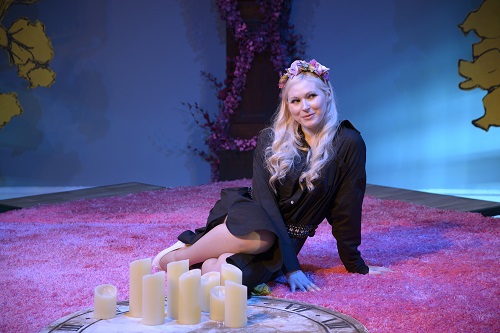
Jennifer Lee’s light, clear soprano was a perfect fit for the ‘ingenue’ Viola, though her naivety – when she sees the ‘friar’ she rejects his services, “We do not want you, we fry for ourselves, And boil and cook if we have aught to cook” – was wryly counterbalanced by a wide-eyed disingenuousness: when her exuberant delight at the knight’s promise of an encounter with a young man leads her father to assume she has been “possessed”, she ‘innocently’ replies, “I’m not possessed yet, but I soon may be!” Matthew Nuttall was a suave Otho/Ghost, confidently manipulating all for his own ends, and bestowing benevolent fortunes in so doing. Cellier’s ensembles are lively and accomplished, and the neat choreography within the confined space, supplemented by natural, detailed singing-acting, brought out their charm and grace.
Cellier’s score may not skip with the wry comic wit of Sullivan – the pastiche fragments of Verdi and Mozart feel a bit heavy-handed – but the melodies keep coming and there’s a refinement throughout, however zany the capers. This was a performance of free-flowing fun, greatly enjoyed.
Claire Seymour
Alberto Caruso: The Master
Henry James – Thomas Birch, Hammond/Oliver Wendell Holmes Jr. – James Wafer, Constance Fenimore Woolson – Annabella Ellis, William James/Edmund Gosse – Lawrence Gillians, Johnston, the butler – Andrii Kharlamov, Hendrik Christian Andersen – Dan D’Souza, Alice James – Isabel Garcia Araújo, Alice Gibbens James – Anna Gregg, Mrs. Edward Saker – Zita Syme, Maud Howe Elliott – Emma Walsh, Lady Louisa Wolseley – Arlene Belli, Miss Loring – Dominica Williams, Mr. Webster – Gabriel Seawright, Mr. Smith – Stephen Walker, Tito – Chris Mosz, Ensemble – Deirdre Higgins, Emma Jüngling; Director – Conor Hanratty, Conductor – Alberto Caruso, Set & Costume Designer – Lisa Krugel, Lighting Designer – Paddy McLaughlin.
Jerome Hynes Theatre, National Opera House, Wexford, Ireland; Saturday 22nd October 2022
Alfred Cellier: The Spectre Ghost
The Grand Duke – Thomas Bennett, His Lord Chamberlan – Monwabisi Lindi, First Lady – Grace Maria Wain, Second Lady – Erin Fflur, Viola – Jennifer Lee, Ghost/Otho – Matthew Nuttall; Stage Director – Sinéad O’Neill, Music Director – Gioele Muglialdo, Set & Costume Designer – Lisa Krugel, Lighting Designer – John Comiskey.
Wexford Arts Centre, Wexford, Ireland; Sunday 23rd October 2022.
ABOVE: The Master at Wexford Festival Opera (c) Pádraig Grant